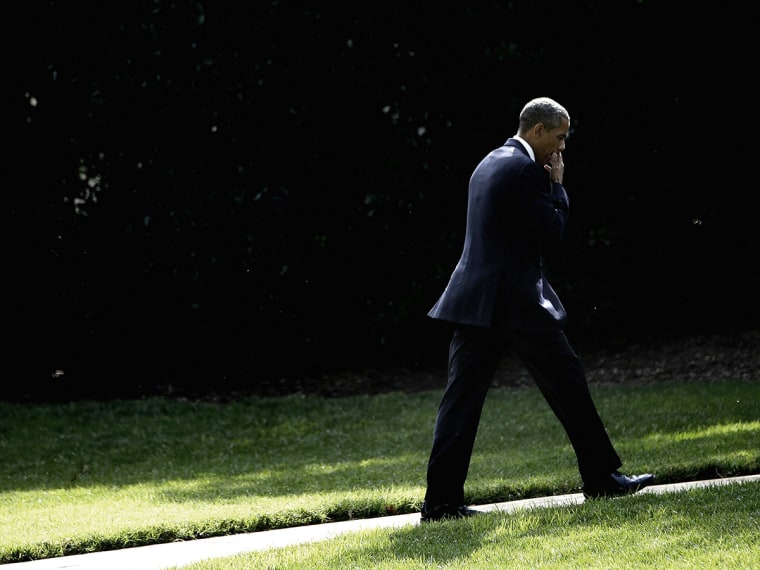Rewind 11 years.
Barack Obama, a little-known state senator in Illinois, had just delivered a powerful speech in Chicago against the Iraq War. He called it “a dumb war,” a “rash war.” He said it was a “cynical attempt” by Republicans to shove their “ideological agendas down our throats” and would distract from the real domestic problems on America’s plate, like poverty and health care.
In many ways, that speech catapulted him to the national stage. It's probably one of the reasons John Kerry tapped Obama to deliver the keynote at the 2004 Democratic National Convention. And Obama's consistent anti-war rhetoric--especially contrasted with Hillary Clinton's relative flip-flopping on Iraq--helped him win the Democratic nomination, and the White House, in 2008.
Obama sought to deliver on those promises in his first term: effectively ending the U.S. war in Iraq and disentangling from Afghanistan, too. The man even won the Nobel Peace Prize.
Now, as Obama weighs military action in Syria, he faces the very real threat of entangling the U.S. in Mideast turmoil.
READ MORE: Kerry readies Americans for intervention in Syria
Polls show that Americans are wary of military action in Syria. But on the other hand, U.S. credibility on human rights and security is at stake. A year ago, Obama said that Syria’s use of chemical weapons would signal that Assad crossed a “red line." Now that red line has been crossed, and if Obama doesn't act, he'll surely endure withering criticism.
This is also a turning point for Obama’s inner circle of relative doves—including U.S. Ambassador to the United Nations Samantha Power, Secretary of Defense Chuck Hagel and Secretary of State John Kerry. They will be tested in the weeks to come. How far are they willing to go to protect Syria's citizens?
Power, throughout her career, has been vocal on her belief in intervention in the case of a humanitarian crisis. She won a Pulitzer Prize in 2002 for “A problem from Hell: America and the Age of Genocide,” which looked critically at the U.S. government’s failure to intervene in mass slaughters.
She tweeted this week on Syria that the “regime must be held accountable, which #UNSC has refused to do for 2+ years. US considering appropriate response.”
Kerry, a decorated Vietnam War hero, eventually joined the Vietnam Veterans Against the War, serving as a nationally recognized spokesman. He has called his 2002 vote as senator authorizing the war in Iraq as the biggest regret of his political career.
This week, Kerry condemned the alleged chemical attacks in Syria as a “moral obscenity,” called for accountability and indicated Obama planned to take action.
And then there’s Hagel. Sure, he’s a Republican and volunteered to fight in Vietnam. But he’s reviled among neo-cons. He did vote for the 2002 Iraq Resolution, but later became a big-time critic of the war. In 2007, he was one of just three Republican senators supporting Democratic-sponsored legislation requiring a drawdown of troops in Iraq within 120 days. He became a fierce critic of the Bush administration, comparing the Iraq War to Vietnam. In 2007, he called Bush’s plan to send 20,000 more troops to Iraq the “most dangerous foreign policy blunder in this country since Vietnam.”
Hagel said this week that U.S. forces are ready to strike Syria if there’s an order by Obama.
The looming Syrian strike is making strange bedfellows on the right, too. Sure, there’s a slew of usual suspects, like Sen. John McCain, who are urging immediate action in Syria.
But there are also theoretically hawkish Republicans opposing military action in Syria. Sen. Ted Cruz said America should not intervene, for instance.
“The United States Armed Forces doesn’t exist to be a policeman for the world and I certainly hope the reaction isn’t lobbing some cruise missiles in to disagree with Assad’s murderous actions,” Cruz told Fox News.
Conservative think tank the Heritage Foundation is also warning against the strikes. And, perhaps laughably, Donald Rumsfeld--George W. Bush’s defense secretary and key architect of the Iraq and Afghanistan Wars--has argued Obama has failed to justify U.S. intervention in Syria. More than 100 members in the House (at least 98 GOPers and 18 Dems) are asking Obama seek congressional approval before taking any action in Syria.
It’s hard to avoid the feeling that those remarks are to oppose the president more than anything else.
